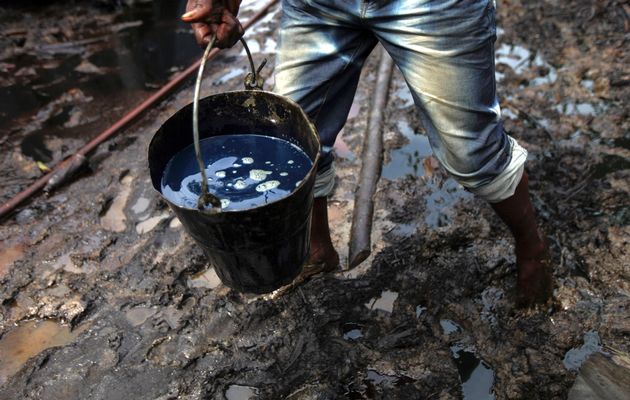The Federal Government has expressed worry over the high rate of crude oil theft in the Niger Delta.
It added that the high-level cases of oil theft have become a threat to the country’s corporate and economic existence as about $3.27 billion worth of oil has been lost to vandalism in the past 14 months.
With this development, the federal government disclosed that the industry is thinking of transporting crude oil from fields to export terminals by trucks.
The Nigerian Upstream Petroleum Regulatory Commission (NUPRC) in a presentation at a stakeholders’ engagement on oil theft in Abuja, said the government was extremely worried about the situation.
Speaking on the issue, the Chief Executive of NUPRC, Engr. Gbenga Komolafe, disclosed that most of the crude oil losses came from Bonny Terminal Network, Forcados Terminal Network and Brass Terminal Network.
He listed the factors aiding the criminal activities as economic challenges, inadequate security, poor surveillance, poor community engagements, exposed facilities and stakeholder compromises.
According to him, due to the high level of theft, the country has been unable to meet its OPEC production quota.
Komolafe said the government was determined to end the menace so that the country can benefit from the rising price of oil and also to protect the environment from oil spills.
He said: “The issue of oil theft has become a very worrisome issue to the government of Nigeria and I believe to you as investors too.
“It is important that the government and the oil companies’ work together to resolve the issue especially on the agreed volume of oil lost to vandals, as the issues strike at the heart of Federation revenue.
“You will recall that in the last one week we have set up a crack team for us to determine the accurate figure.
“As a government we cannot continue to act on the basis of an abstract or inaccurate figure in dealing with an important issue as crude oil theft because the issue goes to the heart of Federation revenue.”
“As a responsible regulator we are very concerned about it. We have been doing a lot and we are not relenting.
“We will do everything possible to increase oil production in a manner that will make the nation benefit from the upward swing in the international price of crude oil,” he promised.
In his remarks, the Chairman/Managing Director of ExxonMobil, Richard Laing, who represented the Oil Producers Trade Section (OPTS) of the Lagos Chamber of Commerce, pointed out that though the issue was not new, it has grown from just oil theft to organized criminality with operational sophistication.
“As an industry, I know how hard my colleagues work to produce products that we need and to suffer the level of theft that we have is disheartening.
“But more importantly, it is a threat to investments, a threat to the health of the industry and wealth of the nation.
“It is important that the stakeholders integrate their activities and their thoughts. As OPTS we have met with a number of stakeholders and we want to make sure that whatever we do is joined up and effective.
“The level of sophistication in terms of tapping into the pipelines, the distributions, efforts required to move hundreds of thousands of barrels a day isn’t some guy coming along and taping into a pipeline and taking container crude oil. It is organized criminality,” Laing said.
On its part, the Independent Petroleum Producers Group (IPPG) disclosed that about 82 per cent of its oil production was stolen in the month of February 2022.
Represented by the Managing Director of Waltersmith Petroman, Chikeze Nwosu, the group said the independent producers were facing “existential threat.”
Nwosu explained that the oil theft challenge has grown from what it used to be in the past of about 4 percent to a high of 91 percent in December, 2021.
He pointed out that the situation seemed to be getting worse despite all efforts to curb it and therefore, called for urgent action from the government and stakeholders.
“The Trans Niger Pipeline is the major issue. We have seen crude theft grow from single-digit percentages to reports of 91 per cent in December for some of the operators who produce into the TNP, 75 per cent in January and the February report we got has an average of 82 per cent.”























Leave a comment